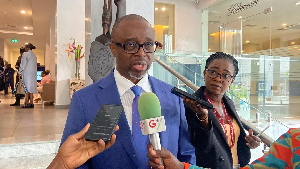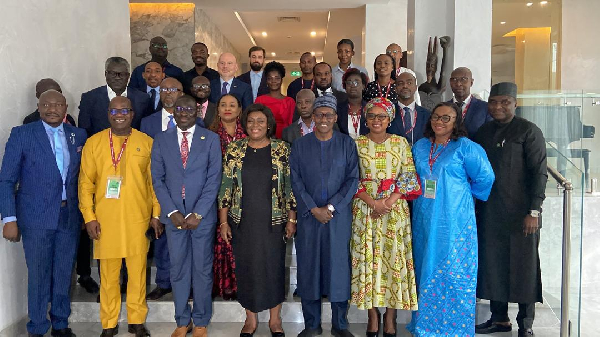 Chief Executive Officer of the Financial Intelligence Centre (FIC) Ghana, Ing Kwadwo Twum Boafo
Chief Executive Officer of the Financial Intelligence Centre (FIC) Ghana, Ing Kwadwo Twum Boafo
Chief Executive Officer of the Financial Intelligence Centre (FIC) Ghana, Ing Kwadwo Twum Boafo, has called for strengthened political commitment and enhanced collaboration among ECOWAS member states to effectively combat money laundering, terrorism financing, and proliferation financing AML/CFT/CPF).
He made this appeal while delivering a speech at the GIABA ECOWAS Resident Representatives Seminar in Accra, on Thursday July 17, 2025.
The two-day seminar, organized by the Inter-Governmental Action Group Against Money Laundering in West Africa (GIABA), is focused on “The Role of Resident Representatives in Fostering AML/CFT/CPF Compliance in ECOWAS Member States.”
Twum Boafo emphasised the crucial role of Resident Representatives in promoting the integrity of financial systems across West Africa.
He outlined four key actions Resident Representatives must prioritize:
Promote high-level political commitment in support of AML/CFT/CPF reforms.
Facilitate consistent engagement between GIABA and national authorities.
Advocate for adequate resources for national AML/CFT/CPF institutions.
Strengthen accountability mechanisms to ensure timely implementation of regional commitments.
He commended GIABA for convening the seminar, describing it as a “strategic engagement to strengthen the capacity of member states to combat financial crime.”
“AML/CFT/CPF compliance transcends mere technical obligations or the pursuit of international recognition. At its core, it is about preserving the integrity of our economies, shielding financial systems from exploitation, and preventing the flow of illicit funds that may support terrorism, organized crime, or erode the foundations of the rule of law,” he stated.
He urged Resident Representatives, who serve as the face of ECOWAS in member states, to leverage their influence to galvanize political will, foster national ownership of AML/CFT/CPF reforms, and engage proactively with national institutions to ensure effective implementation of GIABA’s recommendations.
Edwin W Harris Jr, Director General of GIABA, disclosed that GIABA had undergone significant institutional reforms since 2022, resulting in the removal of Senegal and Mali from the FATF grey list and improved compliance ratings for other member states.
He further revealed that Nigeria and Burkina Faso were scheduled for onsite FATF assessments and could be removed from the grey list by October 2025.
He attributed these successes to renewed staff commitment, improved technical capacity, and stronger collaboration with member states.
However, he cautioned that transnational crimes, including drug trafficking, human trafficking, and migrant smuggling, continued to undermine governance and economic stability in the region.
“Transnational crimes distort macroeconomics, deter investment, and worsen youth unemployment, thereby threatening national and regional security,” Harris warned.
He also announced that the GIABA Ministerial Committee would hold an extraordinary session on July 19, 2025, to deliberate on applications from non-ECOWAS countries seeking membership, citing the need for enhanced regional security cooperation.
Ambassador Perpetua O Dufu, Coordinating Director at Ghana’s Ministry of Foreign Affairs and Regional Integration, delivered goodwill remarks on behalf of the Ghanaian government.

AM/KA
GhanaWeb Special: The gold market that fuels galamsey
